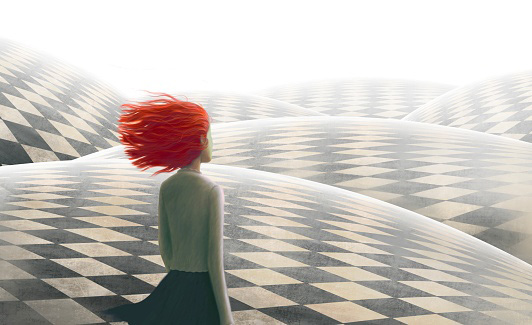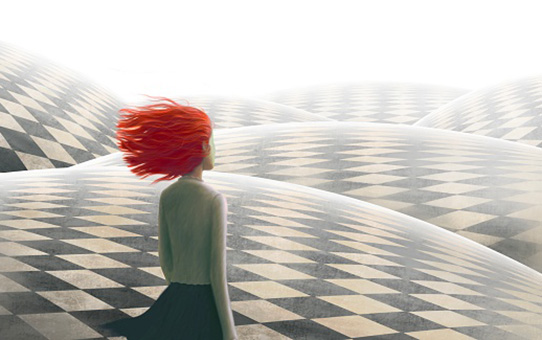A story from the “The Giant Suitcase” collection of stories, by Ivan Dodovski.

The window
Even my gaze through the grey glass is restless now. Noise comes from Roosevelt Street outside. Day and night, a time flows by that I have no share in. Here I am, cooped up in the house, a refugee from myself, distraught. And here’s my migraine again. The clock strikes ten. Saturday traffic outside, and a lack of movement in me. I lie in bed until nine, then get up and make coffee. I come back with my cup, creep under the covers and stare off somewhere, anywhere, nowhere… Now I look out the window but can’t distinguish anything. The hectic pace paralyses me, I taste dust on my lips and smell the exhaust fumes. The bright colours of new cars pierce my eye as they flit past like ghosts. Market day, I say to myself: people are out doing their shopping, they buy and buy. Summer seeps persistently from the asphalt and causes a fiendish throbbing in my temples. Oh God, if I have to spend every remaining weekend of my life like this, I should just die now, resigned and at least without fear. People dash to and fro like mad little ants. Under the trees two women walk cheerlessly, one quite old, the other middle-aged. The car mechanic opposite is at work, lying under a new Range Rover. Further down, at the Folk Art Institute, the rubbish skip bobs to the antics of a bearded Gypsy. His bare feet wave in the air like a rooster’s comb, while his nose—I’m sure—sniffs the leftovers of my neighbours’ hedonistic feasting at the bottom. A tough way of scraping together lunch for his family.
A young woman approaches from the other end of the street slowly pushing a pram. She looks for cars, crosses the street, and disappears around the corner. And the child? Boy or girl? I can’t see. Can it possibly be sleeping though all the noise, dust, fumes, and heat? A stillborn child never to wake? Stop it, I scold myself. Sorry, I say to the baby, and lower my eyes. Fifty meters down in front of the new house on the corner, a dozen people gather and go in. Oh, I’d almost forgotten them—the Adventists. It’s Saturday. They moved to the area two years ago, apparently from America. They hand out leaflets and knock on doors; my mother calls them New Believers. Their smooth-faced pastor startled me at my door a few days ago with his slimy, blunt, “Sister, have you been saved?”
The photo album
I’m single again. Is it too late to start something new now, at forty-two? I’m so tired of striving for happiness… He’s gone. Perhaps it’s my fault because I didn’t try hard enough, was too impatient, too reserved. But who cares now? Balkan men, domineering, frustrated by the changes in society and pinched for money, nervous because their wallets are thinner than their male egos… No, I couldn’t have lasted longer in the relationship even if I had tried. And then she came along: younger, insatiable… After fifteen years of marriage, men suddenly flip like children—get carried away by a new puberty, a youthful cheer, a new blossoming, and think this will ward off the frustrations of middle age. But it’s just a phase, a fantasy. Eventually they have to face everyday realities, they put on weight, their powers recede, and day by day the grimace of old age draws nearer.
The photo album. Should I leaf through the pictures now or not? How often have I reordered them since he left to live with her? Should I burn them, or is it better to wear them out like this, leafing through them in Saturday’s boredom till they fade completely? One day I’ll put them away in a box; I’ll close my life like a deleted scene, as if it never existed.
There’s the wedding. Mother beside me smiling, happy—you can see the piety in her face. Father behind her somewhere, a small figure. Me with a gentle smile under the transparent veil of my hat; I look pensive. And that’s him facing me, freshly shaven, smiling, spruced up, a shirt with long collar points. I turn the pages. We used to travel back then, those were different times; we thought we were living in a perfect welfare state with the Marshal leading us into a bright future. Summer holidays by the Adriatic, cheap wine and rich dinners in Budapest, a peaceful stroll through Verona. That was all once upon a time, with him, under socialism; he ran a small state-owned forestry firm and I was a secretary at the public revenue service. We took out a loan, bought a piece of land, built a house. Father retired and joined mother, who diligently kept house. We lived a decent, happy life. “Only one thing pains me—,” I once overheard father say to mother, “they have no children.”
A Feast Day?
I sit at the table with mother. Slowly, her hand shaking, she slurps her soup. I hardly recognize her now in her old age; she too has withdrawn into silence, her movements fade beneath a burden of unknown thoughts. Sometimes I watch her in the mornings when she stands on the threshold of the old bedroom that a carpenter furnished for her wedding night with father long ago. She stands on the threshold, hunched over with sagging breasts but impeccably clean in her nightgown, her hair white. She lets the comb glide down past her ears slowly as if she were combing out the years. I bring her tea. She says nothing.
“Eight years,” mother says, as I lay a piece of fried fish on her plate. “Exactly eight years tomorrow.” I say nothing. She’s reminding me of father’s death, she doesn’t let me forget anything important, and I am beginning to forget everything. She just needs to say a few words to bring back pictures from the past; sometimes that really gets under my skin, but mother can’t live without such memories, even if they’re painful. I, on the other hand, am fading. I want everything to be erased from my memory; my past is a burden and my present… I eat some fish and try not to think. Mother glances at me, almost reproachfully. Yes, I agree, the images have to be kept alive; memory must be kept alive so it can be imprinted on everyday life like a new stamp. Father died of a heart attack, unexpectedly. We found him stretched out in the armchair, the daily paper on his face. To his dying day he fretted about politics, despite mother’s scolding. In those troubled times, the fall of Yugoslavia and socialism meant the beginning of uncertainty for him. To this day I don’t understand the Russophile ideas he would bombard us with at family meals. “They’ve forced Russia to her knees,” he repeated passionately, with grief and pent-up anger. For him, we were at the start of a new Dark Age, unfathomable and dangerous. That’s probably why he departed so suddenly—so as not to experience the unknown.
“Tomorrow is a feast day,” mother says, “I’m going to church and then to the graveyard.” I’ve never understood her dedication to remembrance, her faith and her composure over time. She remembers feast days, but there’s no trace left in me of what she calls feast days—feasts of Our Lady, feasts of The Lord, feasts of the saints… I can’t remember which feast day it is tomorrow and don’t want to offend her by asking. She calmly finishes off her fish and then crosses herself. I’m starting to envy her, though I don’t understand her; I don’t know where her order and tranquility come from, I don’t understand what gives her strength. What she believes in is unknown to me, foreign. I can’t think about that, my head is full of worries about the bills; sometimes I want to tell her that the pension she inherited from father and my meagre office-job salary are not enough to make ends meet. But I don’t say anything. We eat cheap soup and cheap fish, I scrimp and save, and she knows without me having to tell her. We sit in silence. Yes, it infuriates me, I feel sick, senseless words swirl around in my head, and my temples thud. Oh God, if only this day and this chaos would pass, I say to myself. I get up and clear the table. Mother goes to her room to have a rest.
An altar?
I feel I have to do something, to put things in order. All this time an irresistible urge has been growing in me to sort things out. But where do I start? I have to do something as soon as I can, right now, if possible, before I fall down dead. I know—I’ll tidy the house, dust and air the rooms. Time to start. First I vacuum the living room. Next I go into the bedroom and take everything out of the cupboards. I go through the old things we keep in the upper cupboard and sort them. What I don’t need I set aside, the rest goes back. I close the cupboard. That’s step one. The windows are open, a few rays of sunshine slant obliquely into the rooms. The day is waning and I have to put the house in order while I still have the strength.
I go out to the street and head to the rubbish skip to leave my old clothes and things there. Someone is bound to take them. But I see a startling scene: a crowd of people by the rubbish skip. People come, lay down their old things, and leave again in silence. A long line of people, piles of old things—the place becomes a kind of altar. My eyelids begin to tremble, I think I’m going to cry, but I have no tears. I see the vacant look in people’s faces.
When I get home, mother is sleeping, so I can’t tell her anything. I sit down on the stool by the toilet door and look in the mirror. Yes, I say to myself, it’s not just me—everyone is cleaning up. You have to do something, create some order, you have to put an end to this chaos and this nausea. But my body… my body is growing ever more tired, ever older. The sounds in the house fade, the day drowns, the corners of the room stare at me mutely, and the colours of the house slowly ebb into an endless void.
Translated from Macedonian by Will Firth
